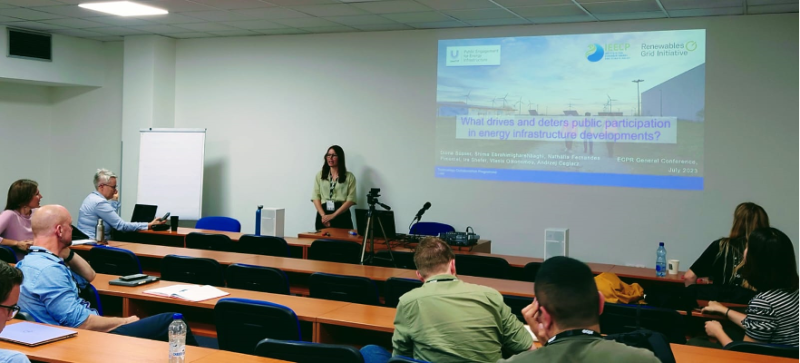What drives and deters public participation in energy infrastructure development? This was the key question we addressed during our presentation at the General Conference of the European Consortium for Political Research (ECPR).
The session ‘Achieving and sustaining public legitimacy and acceptance for accelerating the energy transition’ allowed us to present our key findings based on a literature review and expert interviews we conducted. Our research shows that public engagement with energy infrastructure can be facilitated or hindered by a variety of socio-psychological, socio-economic, socio-technical and institutional factors emanating from people, project developers and policy makers. Poorly designed participation processes can lead to anger and mistrust, which can even be an obstacle to acceptance or lead to project failure.

An interesting question raised by the participant was about the inclusiveness of stakeholder participation: Should some people be excluded? Our research shows that experts agree on the importance of inclusiveness and support an open invitation to different stakeholder groups. However, in practice, it is difficult to include everyone, as not everyone cares about energy and therefore wants to participate. The choice of methods and location also determines who you reach and what people will or will not say.
Another interesting question was whether energy projects are different from other infrastructure projects. Any project involves change – and people often do not like change in their environment. So you might see similar resistance to a wind turbine or a new road, because they both affect the places where people live. What may be different, however, is that the direct benefits of energy infrastructure to people are less well understood. A new road can be used directly by people, while a wind turbine provides “less tangible” electricity. However, each energy technology has specifics in terms of visual impact and opportunities for financial participation, which leads to differences in people’s acceptance.
Finally, we discussed the differences between formal and informal participation. Indeed, mandatory regulations and rules function as binding legal instruments that require developers and regulators to involve the public in energy infrastructure projects. However, we find that especially when people do not feel sufficiently involved in project development, they find their own informal ways to express their opinions, for example through citizens’ initiatives and protests.
The ECPR gave us a great opportunity to discuss our research. The report of our findings will be published soon.

